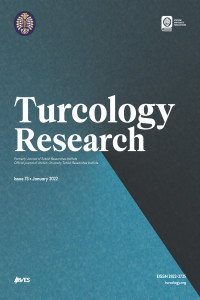Abstract
Anadolu’nun İslamlaşması ve Türkleşmesinde aynı şekilde Yesevî öğretinin yayılmasında büyük etkileri olan Yunus Emre’nin dinî düşünce sisteminin incelenmesi ve araştırılması kuşkusuz büyük önem arz etmektedir. Onun dinî, tasavvufî, ahlakî, sosyal, kültürel, siyasî, tarihî, ilmî ve edebî kişiliğiyle ilgili bugüne kadar yüzlerce makale, onlarca kitap kaleme alınmıştır. Ne var ki esnaf ve tüccar anlayışıyla, bağ bahçe, huri ve gılman beklentisi ve cehennem azabı korkusu ve endişesiyle Tanrı’ya kulluk eleştirisine dair şimdiye kadar araştırdığımız kadarıyla bir çalışma henüz yapılmamıştır. O bakımdan bu çalışmada, Yunus Emre’nin farklı nüsha ve baskılarından oluşan Risaletu’n-Nushiye’si ve Divan’ında Tanrı’ya tüccar anlayışıyla yapılan kulluk eleştirisi irdelenmiştir. Bu yönüyle araştırma, alana yeni katkılar sunan otantik ve özgün bir çalışma özelliğindedir. Literatür taraması yönteminin kullanıldığı bu araştırma sonucunda, Yunus Emre tarafından, sûfîlerin ve zahir şeriat ehlinin özden, Tanrısal sevgiden, samimiyet ve ihlâstan yoksun dindarlık anlayışının; cennet nimetlerine ve cehennem korkusuna, Ben’in çıkar ve kârına dayalı şekil ve görüntüde kalan dinî tutum ve tavırlarının yadsındığı; tam tersine salt sevgi ve saygıdan kaynaklanan Tanrı’ya kulluğun ise öncelendiği görülmüştür.
Keywords
References
- Başgöz, İ. (1999). Yunus Emre. Cumhuriyet Dünya Klasikleri Yayınları.
- Çubukçu, İ. A. (1973). “Yunus Emre ve Din Felsefesi”. Ankara Üniversitesi İlahiyat Fakültesi Dergisi. XIX, 1-15.
- Dalkılıç, B. (2019). Yûnus Emre. İstanbul: Kardelen Yayınları.
- Eyuboğlu, S. (1971). Yunus Emre. İstanbul: Cem Yayınevi.
- Gölpınarlı, A. (1941). Yunus ile Âşık Paşa ve Yunus’un Bâtınîliği. İstanbul: Kenan Basımevi.
- Gölpınarlı, A. (2006). Yunus Emre Hayatı ve Bütün Şiirleri. İstanbul: Türkiye İşbankası Kültür Yayınları.
- Halman, T. (2003). A’dan Z’ye Yunus Emre. İstanbul: Yapı Kredi Yayınları.
- Kadı Ahmed. Negîdî, el-Veledüş’şefîk ve’l-Hâfidü’l-Halîk. Fatih Ktp. Nr. 4518, 21b, str. 15-19.
- Köprülü, F. (1976). Türk Edebiyatı’nda İlk Mutasavvıflar. 3. Bsk. Ankara: Türk Tarih Kurumu Basımevi.
- Kurnaz, C. (1991). “Yunus Emre’de Tenkit”. Türk Kültürü Araştırmaları. XXIX, 1-2, 257-263.
- Özçelik, M. (2010). Bizim Yunus. Ankara: Eskişehir Valiliği Yayınları.
- Öztelli, C. (1965). “Şeyhü’l-İslam Ebus Suud Efendi’nin Fetvalarında Yunus İlahileri”. Emre Dergisi, 2 (16), 5-6.
- Öztelli, C. (1992). Yunus Emre Yaşamı ve Bütün Şiirleri. 4. Bsk., İstanbul: Özgür Yayın Dağıtım.
- Taş, İ. (2010). Yesevi ve Yunus’ta Sufi Eleştirisi. I. Ulusal Yunus Emre Sempozyumu, 22-23 Mayıs 2009-Karaman, 2010, 265-284.
- Tatçı, M. (t.y). Yûnus Emre Dîvânı. Ankara: Kültür ve Turizm Bakanlığı Kütüphaneler ve Yayımlar Genel Müdürlüğü Yayınları.
- Tekindağ, M. C. Ş. (1966). Büyük Türk Mutasavvıfı Yunus Emre Hakkında Araştırmalar. Belleten, 30 (117), 59-90.
- Timurtaş, F. K. (t.y). Yunus Emre Divanı. İstanbul: Tercüman Gazetesi Yayınları.
- Toprak, B. (2006). Yunus Emre Divanı. 3. Bsk., İstanbul: Odunpazarı Belediyesi Yayınları.
- Yunus Emre, Nasihatler Kitabı (Risâletu’n-Nushiye). 2013. Eskişehir: Türk Dünyası Kültür Başkenti Ajansı Yayınları.
Abstract
No doubt, it has great importance to examine and study the religious thought system of Yunus Emre, who had great impacts on the Islamization and Turkification of Anatolia and the spread of Yesevi School. Hundreds of articles and tens of books have been written about his religious, mystical, moral, social, cultural, political, historical, scientific, and literary personality. However, as far as we investigated, there has not been any study so far that was conducted on the criticism of worshiping God with the understanding of tradesmen and merchants, the expectation of vineyards and gardens in the paradise, houris and gilmans, and the fear and anxiety of the hellfire. In this respect, the criticism of serving to God made with the understanding of being a merchant in Risaletu’n-Nushiye and Divan, which consist of different copies and editions of Yunus Emre, was examined in the present study. In this context, the study had an authentic design and is an original study offering new contributions to the field. As a result of this study, in which the literature review method was employed, it was found that Yunus Emre denied the understanding of piety that lacked essence, divine love, sincerity, and sincerity of the Sufis and the people of the apparent sharia, the religious attitudes, which remained only in shape and mere appearance, based on the demand for heaven and the fear of hell, the interest and profit of the self, and on the contrary, it was found that serving to God, which stemmed from pure love and respect, was prioritized.
Keywords
References
- Başgöz, İ. (1999). Yunus Emre. Cumhuriyet Dünya Klasikleri Yayınları.
- Çubukçu, İ. A. (1973). “Yunus Emre ve Din Felsefesi”. Ankara Üniversitesi İlahiyat Fakültesi Dergisi. XIX, 1-15.
- Dalkılıç, B. (2019). Yûnus Emre. İstanbul: Kardelen Yayınları.
- Eyuboğlu, S. (1971). Yunus Emre. İstanbul: Cem Yayınevi.
- Gölpınarlı, A. (1941). Yunus ile Âşık Paşa ve Yunus’un Bâtınîliği. İstanbul: Kenan Basımevi.
- Gölpınarlı, A. (2006). Yunus Emre Hayatı ve Bütün Şiirleri. İstanbul: Türkiye İşbankası Kültür Yayınları.
- Halman, T. (2003). A’dan Z’ye Yunus Emre. İstanbul: Yapı Kredi Yayınları.
- Kadı Ahmed. Negîdî, el-Veledüş’şefîk ve’l-Hâfidü’l-Halîk. Fatih Ktp. Nr. 4518, 21b, str. 15-19.
- Köprülü, F. (1976). Türk Edebiyatı’nda İlk Mutasavvıflar. 3. Bsk. Ankara: Türk Tarih Kurumu Basımevi.
- Kurnaz, C. (1991). “Yunus Emre’de Tenkit”. Türk Kültürü Araştırmaları. XXIX, 1-2, 257-263.
- Özçelik, M. (2010). Bizim Yunus. Ankara: Eskişehir Valiliği Yayınları.
- Öztelli, C. (1965). “Şeyhü’l-İslam Ebus Suud Efendi’nin Fetvalarında Yunus İlahileri”. Emre Dergisi, 2 (16), 5-6.
- Öztelli, C. (1992). Yunus Emre Yaşamı ve Bütün Şiirleri. 4. Bsk., İstanbul: Özgür Yayın Dağıtım.
- Taş, İ. (2010). Yesevi ve Yunus’ta Sufi Eleştirisi. I. Ulusal Yunus Emre Sempozyumu, 22-23 Mayıs 2009-Karaman, 2010, 265-284.
- Tatçı, M. (t.y). Yûnus Emre Dîvânı. Ankara: Kültür ve Turizm Bakanlığı Kütüphaneler ve Yayımlar Genel Müdürlüğü Yayınları.
- Tekindağ, M. C. Ş. (1966). Büyük Türk Mutasavvıfı Yunus Emre Hakkında Araştırmalar. Belleten, 30 (117), 59-90.
- Timurtaş, F. K. (t.y). Yunus Emre Divanı. İstanbul: Tercüman Gazetesi Yayınları.
- Toprak, B. (2006). Yunus Emre Divanı. 3. Bsk., İstanbul: Odunpazarı Belediyesi Yayınları.
- Yunus Emre, Nasihatler Kitabı (Risâletu’n-Nushiye). 2013. Eskişehir: Türk Dünyası Kültür Başkenti Ajansı Yayınları.
Details
| Primary Language | Turkish |
|---|---|
| Subjects | Regional Studies |
| Journal Section | Makaleler |
| Authors | |
| Publication Date | January 30, 2022 |
| Published in Issue | Year 2022 Issue: 73 |

